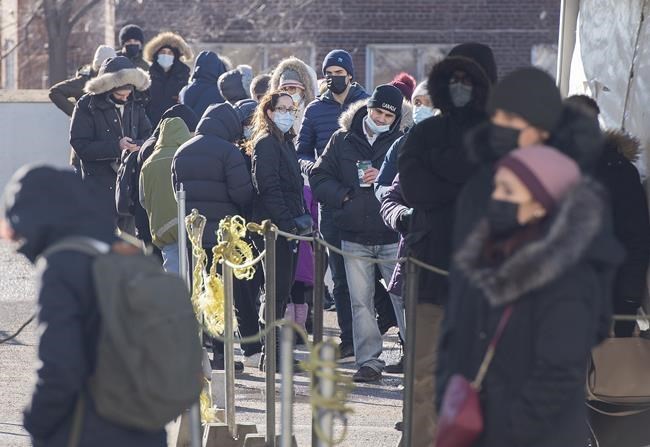Several provinces on Tuesday issued new health orders to slow the spread of the Omicron variant of the novel coronavirus, which is disrupting holiday plans across the country and threatening governments' abilities to control COVID-19 transmission.
Ontario imposed new restrictions on visits to long-term care homes, and Quebec ordered many civil servants home and recommended employers prioritize remote work, effective immediately. Prince Edward Island, meanwhile, imposed limits on private indoor gatherings.
The new rules came hours before a scheduled virtual meeting between Prime Minister Justin Trudeau and provincial and territorial premiers to discuss the spread of Omicron. Federal Health Minister Jean-Yves Duclos told reporters in Ottawa discussions would include new travel recommendations for Canadians.
"We are very concerned about those that would be travelling abroad at this particular time," he said Tuesday. "What we’re seeing is an incredibly rapidly spreading variant, and we are worried about Canadians that might end up either stranded or sick abroad."
Duclos would not say whether the federal government would follow the lead of the United Kingdom and lift the border restrictions on African countries that were imposed when the variant was first identified. Canada has limited travel from 10 African countries because of the variant, the presence of which has been confirmed in at least 77 countries and in 30 U.S. states.
"We are considering all options and all actions, and that requires a conversation between the premiers and the prime minister," he said.
Dr. Kieran Moore, Ontario's chief medical officer of health, said he expected the Omicron variant to account for all new COVID-19 cases in the province by the end of the month. “It is rapidly becoming the dominant strain in Ontario,” he told reporters in Toronto on Tuesday.
“While there is still some uncertainty around the virulence of Omicron, we have good evidence that it is more transmissible than the Delta variant,” Moore said. “This means even if it is less severe, with so many people infected, there may be significant demands on the health-care system.” There were 95 confirmed cases of the variant in the province.
Earlier on Tuesday, Ontario's long-term care minister, Rod Phillips, said his province would increase COVID-19 testing in long-term care homes and tighten restrictions on visitors and resident activities.
Moore said he would recommend further provincewide measures to slow the spread of the variant. Regional public health authorities in several parts of the province, including Peterborough, Kingston and Waterloo, have already implemented their own restrictions.
Quebec's public health institute said Tuesday it had confirmed 11 cases of the variant in the province and identified 11 more suspected cases, but Health Minister Christian Dubé said he believed those figures may be underestimations.
Dubé said all positive COVID-19 tests identified on Tuesday would be screened for the new variant and that the province would hire more vaccinators. "With the rising cases and the potential of Omicron, we want to accelerate booster vaccinations," Dubé told reporters in Montreal.
He recommended employers prioritize remote work and pledged to issue free rapid tests to the public next week. Dubé said 30 per cent of dedicated COVID-19 beds in the province's hospitals were occupied.
Dr. Heather Morrison, Prince Edward Island's chief public health officer, said Tuesday the province had detected its first case of the Omicron variant.
Morrison said new restrictions on private indoor gatherings would come into effect on Friday and that people arriving on the Island would be required to isolate until they received a negative COVID-19 test result. The province requires everyone aged eight and older to be tested on arrival.
Morrison said the Omicron case is linked to a COVID-19 outbreak at St. Francis Xavier University in Nova Scotia.
British Columbia said it had identified 44 cases of the variant as of Sunday as health officials recommended against large holiday parties with COVID-19 cases poised to rise because of Omicron.
Provincial health officer Dr. Bonnie Henry said B.C. won't likely roll out free at-home rapid tests before January because the province ordered a different type of test than its counterparts that are distributing tests in time for the holidays.
The bulk of rapid tests that B.C. already has on hand — about 1.3 million — must be administered by a medical professional using a special machine.
"Our testing strategy has been different from those used in other provinces all along," Henry said, adding B.C. has been focused on "making sure we get the right person the right test at the right time."
Those who have tested positive for Omicron are between the ages of five and 72. None have been hospitalized and all but seven were vaccinated, she said. The Health Ministry said 20 of those infected recently travelled to Nigeria, South Africa, Zimbabwe, Egypt, Iran, Mexico, Germany, Portugal or the United States.
The Omicron variant appears to cause less severe disease compared with previous versions of the novel coronavirus, according to an analysis by South Africa's largest private health insurer and by the South African Medical Research Council. The variant, however, is believed to be more transmissible.
The analysis, which has not been peer-reviewed, indicated that the Pfizer-BioNTech vaccine may offer less protection against infection from the variant compared with previous strains but that it continues to offer a high level of protection against hospitalization.
This report by The Canadian Press was first published Dec. 14, 2021.
— With files from Holly McKenzie-Sutter in Toronto, Amy Smart in Vancouver and The Associated Press.
———
This story was produced with the financial assistance of the Facebook and Canadian Press News Fellowship.
Jacob Serebrin, The Canadian Press



